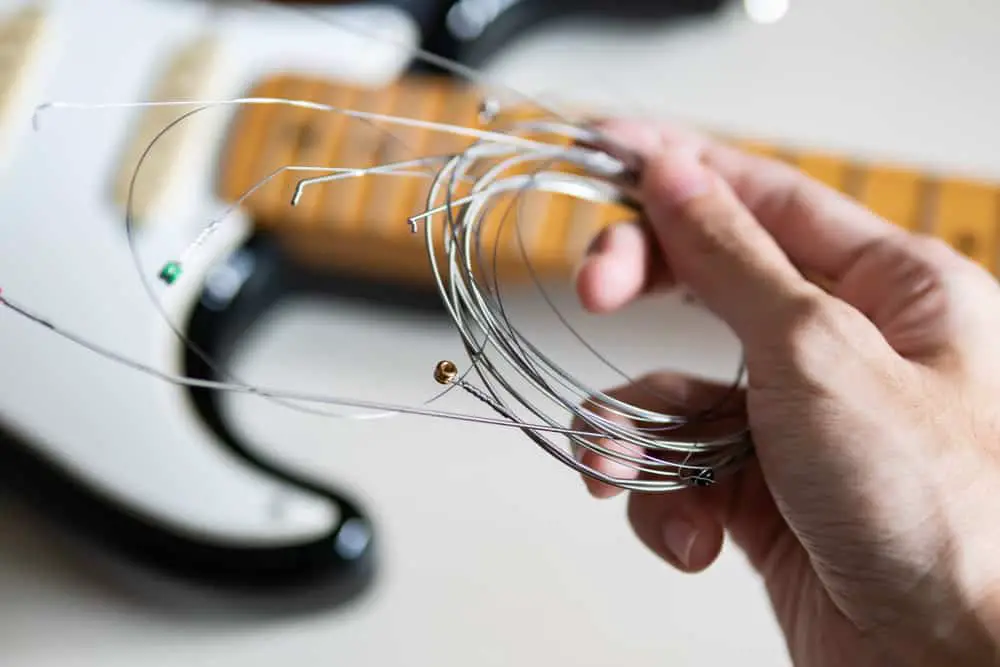
So, you’ve been having fun playing your guitar for a while now. But then it seems your guitar is starting to give the wrong tone. You keep tuning your guitar strings almost every day to maintain the tune.
What do you think? Is it time to change your guitar strings?
Knowing when to change your guitar strings is key to maintaining your guitar’s performance. Some say that you should change your guitar strings once every three months. Others believe that changing your guitar strings should be after 100 hours of playing.
There are different opinions about when to change your guitar strings. But, it all boils down to how often you play your guitar. Below, you’ll find the things to look out for to know when to change your guitar strings.
Why Should You Change Your Guitar Strings?

It’s pretty easy to know that you should change your guitar strings when they’re broken. But what if they’re not broken? After all, if it’s not broken, there’s no need to fix it, right? Actually, no.
Changing your guitar strings isn’t all about replacing broken strings. It’s more about maintaining the health and performance of your guitar strings.
Think about it this way; if your guitar strings are healthy and sharp, they’ll sound or perform better.
Just as everything ages over time, your guitar strings also age gradually. The more you play your guitar, the more the guitar strings age or wear out.
Now think about a race between an older man and a teenager. Who wins easily? The younger one will win easily.
Why? He has more energy thanks to being younger and fresh in age.
When your guitar strings age, they start sounding dull and weak. You’ll discover that you’ll have to keep tuning your guitar almost every time you want to play.
Why? Your guitar strings can’t hold the tune since they’re worn out.
Do you know how older people tend to complain about stiff joints? Your guitar strings also grow stiff as they age. As a result, you’ll find it tougher to strum or move your fingers across the strings.
So, why should you change your guitar strings? It’s simple; to keep them healthy and sharp for each performance or practice.
When Should You Change Your Guitar Strings?

Now that you know that changing your guitar strings is important for maintaining the strings’ health and performance, what next? You need to know when to change your guitar strings.
As a rule, playing your guitar is what makes the strings age. So if you play your guitar a lot, then your guitar strings will age faster.
Usually, professional guitarists who play often change their guitar strings at least once every three to four gigs. Depending on how often you play your guitar, you’ll need to change your guitar strings periodically.
But then, playing your guitar isn’t the only thing that causes the strings to age. Dust, oil, and dirt from your fingers also wear out the guitar strings.
Even if you keep your guitar unplayed for months, the accumulation of dust and dirt will weaken your guitar strings. It’s often easier to remember to clean your guitar whenever you want to practice than to leave it on the shelf forever.
So when should you change your guitar strings?
If your guitar strings aren’t broken, you may need to change them periodically. This may vary depending on how often you play. Once after 100 hours of play or two to three months is a great time to change your guitar strings.
The Signs You Should Look Out For

As a rule, you should change your guitar strings periodically to keep them from wearing out. There are telltale signs to look out for if your strings are wearing out.
Once you notice any of these signs, then it’s time to change your guitar strings.
Guitar Strings Don’t Stay Tuned For Long
While it’s pretty easy to tune your guitar, doing it often can be annoying. But that’s a clear sign that your guitar strings are worn out.
Usually, old guitar strings are too weak to stay in tune. Although they may hold the tune for a short practice session, they eventually slack off after a day or two.
If your guitar strings aren’t maintaining their tune, you need to change them.
Guitar Tone Sounds Wrong
While your guitar may sound off due to wrong tuning, the strings are usually the culprits. It’s easy to know when your guitar tone sounds off if your ears are trained.
If your guitar tone sounds flat after tuning your guitar strings, then it’s time for fresh strings. Healthy strings always sound clear and sharp.
Guitar Strings Are Stiff
Old guitar strings tend to feel stiff. As a result, they don’t give off a clear sound. When your guitar strings are stiff, you’ll find it hard to strum and move your fingers across them.
If your guitar strings are starting to feel stiff, you need to get new ones.
Guitar Strings Are Bumpy And Dirty
Healthy guitar strings feel clean and smooth even after use. As they age, guitar strings tend to gather dust and dirt. The accumulation of dirt often makes the strings feel bumpy when you run your finger across them.
If, after cleaning, your guitar strings still feel rough, bumpy, and dirty, then it’s time for new strings.
Guitar Strings Look Faded
Over time, guitar strings tend to lose their coloring and coating. This often leaves them appearing faded and feeling rough.
When your guitar strings appear faded and rough, it’s time to get fresh strings.
Conclusion
Healthy guitar strings are essential for performance and aesthetics. If they’re sounding or looking off, then you should change them.
Remember, it’s not until the guitar strings are broken that they should be changed. If you’ve played the guitar for a while, you should think about changing the strings.








